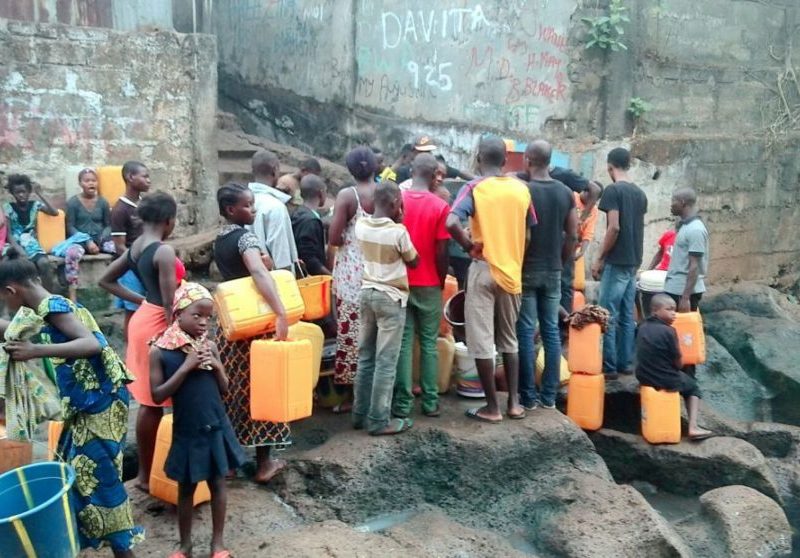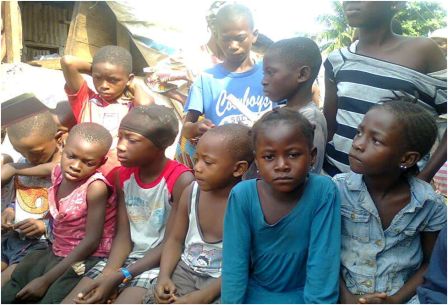Sierra Leone’s Common Enemies: Poverty and Underdevelopment
When politicians in Sierra Leone are determined to solidify their base by appointing their regional cronies to the helm of power or use geopolitical tactics to energize their stronghold, many don’t know that our nation constantly suffers from these horrendous activities. Many are oblivious to the fact that our common enemies are poverty and underdevelopment. I have long affirmed that the lack of electricity, weakened public institutions, poor governance, and unethical leadership are the colossal symptoms of the collective challenges we must overcome, both politically and psychologically.
The serious and fundamental challenges Sierra Leone faces are: an acute deficiency in our political thinking, a loss of national values and our beleaguered economic aid dependency culture. We must shift from such troubled behaviors if we are to realize a Sierra Leone free from poverty and a nation full of many possibilities.
If we think as a region and not as a country, we will continue to create more problems when we should be finding solutions to our existing and emerging threats. If we see each other as distinct tribes, seeking only the welfare of those who speak like us, we are building a dark and dangerous future for ourselves. The repeated cycle of violence and the negative consequences of those who feel marginalized will loom larger over our heads like a growing ominous cloud. We cannot escape these realities without accepting the practical option of coming together with a shared vision and working in the nationalistic spirit of progress for our country.
Thinking as a Sierra Leonean “first” is a strategic solution to many of the political and economic dilemmas we are experiencing today. When we overcome these social barriers, the logistical nightmares like scarce electricity, water supply problems, joblessness and other public delivery services will be significantly improved. We can begin to work as a team of nation builders and no longer as individual regions or divided groups of people.
Thus, our stimulating choices are: building a prosperous Sierra Leone through education, technology and investment. We can make Sierra Leone become a full participant in the global society and help to create wealth or income for our citizens through private sector jobs and small business opportunities on a national level. This will eliminate the real enemy: Poverty.
“Nation First” Concept
Historically, regionalism and tribal supremacy have dominated our political culture for almost half a century now. Our two oldest political parties (APC & SLPP) have been notorious for championing such dreadful politics that have polarized Sierra Leone and strangled national development. The way these parties often formulate policies and even the structure of cabinet appointments show how they have come to perpetuate insidious division within our national conscience.
A “nation first” concept is the way forward for Sierra Leone. We must develop a political orientation where tribes and regions do not determine our decisions when appointing or electing citizens to position of leadership in Sierra Leone. A national approach of solving our common problems must be broad base and inclusive while every Sierra Leone must be part of finding comprehensive solutions to our compounding problems. After all, no region or tribe is immune to the problems of unemployment, electricity shortages and declining educational standards.
What appeared to be a “system of political compensation” is turning into a pattern of unpatriotic acts committed by some of these political parties. The future of Sierra Leone has been held hostage for too long by narrow- minded politicians who see a promising future only for themselves.
It is time for a new thinking and a new economic order that must lift us from the cycle of poverty and social deprivation. We need to fight poverty with a three prong approach: Investment in education, advancement in new technology and the promotion of new trade with our donor partners.
The future of all tribes and regions are mutually intertwined and cannot be separated regardless of what some political parties might claim. Poverty must be the common enemy we should be boldly fighting against not scraps of privilege and influence.
And politics should be about ideas and how these ideas are translated into better living conditions for the people. The two oldest political parties (APC & SLPP) in the continent of Africa have failed to meet the bench marks of good governance and the growth of Sierra Leone’s struggling economy.
A Legacy-Driven Politics
If Sir Milton Margai was sitting at State House today and looking around to see why his party and the APC have generally failed the people, it would be his assertion that our political leadership has lost their way and forgotten about the past legacy of other nationalists who made Sierra Leone a beacon of hope.
Sir Milton Margai knew that leadership was about cooperation, even with your enemies, in order to bring about the best possible results for the nation as a whole. He dreamed, as we all do, of a Sierra Leone that is not only free, but a Sierra Leone that reflects the true inner greatness of its people.
Bai Bureh from Port Loko district taught us that we should always stand up for what is right. Against the powerful guns of the British Governor General, a tall bearded man from the heart of Port Loko resisted the economic injustice of paying a hut tax because he believed it was wrong. And the epic dimension of his fearless patriotism was that he did it for others. That is who we are as Sierra Leoneans if only we remember our history.
Our nation has been guided by such famous personalities, but today we ignore the tenets of our founding principles. We have become a nation more interested in what we do for ourselves than what legacy are we building for the next generation. We have abandoned the core values of our progressive nation and resorted to a heartless competition over who has the best strategy to destroy the honorable careers of others. We have stopped reaching for what is possible and our young people are uninspired and lack the opportunities to fulfill their dreams.
The great icon, ITA Wallace Johnson was a foot soldier of the people. He educated us how to organize and fought for the rights of the common worker. He was a monumental figure, who stood against colonialism and promoted the Pan African movement in Sierra Leone and Africa. Was he about self-serving aggrandizement or was he more interested in the future of his people? That is what legacy is about- doing something for the good of society and not for a region or tribe.
At no time in our history do we need a legacy-driven culture more than today. Sierra Leone must think anew and restore those lost national values we inherited from our founding fathers. What is a serious deficit on our political balance sheet is the lack of new leadership that brings Sierra Leoneans together not on regional or tribal platforms, but on political ideas and innovation that stimulates growth, help build a bridge, lift a child from poverty and make life better for our people.
Strong Institutions
There is no greater calling than to work harder to rebuilding our failing institutions in Sierra Leone. More than ever, we can only build credible institutions through democratic principles and transparent leadership. Only through visionary leadership and a strong civil service-resource base, and equipped with the working tools, can our institutions be competent enough to provide an effective delivery system.
Additionally, government has permeated corruption in an abstract or non-strategic sense that, a low or no salary payment has triggered the institutionalization of corrupt practices in the civil services and the police force. We cannot seriously plug these gaping holes without comprehensively addressing the problem of poverty and the need to provide the capital resources to sustain the public labor force. We must come together to defeat this merciless enemy that has terrorized Sierra Leone for ages: Poverty.
Aid and Dependency
Prospectively, Sierra Leone’s new vision must be to move away from the economics of aid and dependency, and towards the economics of the Industrial Revolution. We must open new factories and industries to create jobs for Sierra Leoneans. Through foreign investment and the advent of a strong private sector, we can transform Sierra Leone’s labor market into a new middle class and become the “new factory floor” of Africa.
Strategically, trade is the engine of growth. If Kenya has tea, Ghana has coffee and Botswana has beef for trade, can Sierra Leone not export its cocoa and other agricultural products to China, the EU and even to the United States? Indeed, trade creates employment, improves trade balances, lowers the prices of goods and generates income through tariffs and tax revenues for the government of Sierra Leone.
However, a new way of thinking is needed for Sierra Leone to aggressively shift from our fatal addiction to aid. Africa, including Sierra Leone over the past 60 years has received more than $1 trillion dollars of development aid money and has not made our country better off. The $20 million dollars aid commitment from the World Bank (July 20, 2010) will not create employment for our youths. We need factories, new technologies and investment capital not concession loans.
Aid money only creates huge debt burden, promotes a poorly managed economy, increases poverty and corruption, discourages foreign investment and creates an inflation prone market in Sierra Leone. That has been the economic reality of the donor-driven mentality for many years and will continue to take the similar outcome in the future. It is time for a change and a new direction.
Thus, we need a strong investment in the education of Sierra Leoneans to build a large skillful work force, encourage small business ownership and produce more technocrats (doctors, engineers, architects, nurses, lawyers, etc.). The rise of a new elite leadership can advance the delivery capacity of our public institutions thereby improving the living standard of our citizens. We cannot be a “beggar nation” and expect to improve the economy and way of life of our people through wire transferred funds form the International Financial Institutions.
Constructively, the new plan for Sierra Leone is to develop a solid economic strategy. Let us have only 5 percent of our development financing to come from aid (World Bank or International Financial Institutions), 35 percent from trade, 25 percent from foreign direct investment (FDI), 10 percent from capital market (access to international bond market) and the 25 percent coming fro remittance (Diaspora sending money home) with a robust domestic saving strategy. With a diversified portfolio, a new economic outlook for Sierra Leone will bring about a huge “turn around” of our troubled financial dependency on donors. As President Abdoulaye Wade of Senegal eloquently puts it: “Africa took the wrong road after independence on the aid phenomenon.” Is Sierra Leone ready to take the right path to an independent industrial market economy?
By Mohamed C. Bah
Stay with Sierra Express Media, for your trusted place in news!
© 2010, https:. All rights reserved.







Steven Samuels
/
Well said M. C. Bah
16th August 2010